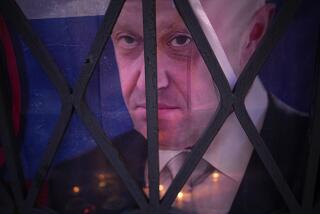Tikhonov Is Replaced by Gorbachev Ally as Premier
- Share via
MOSCOW — Nikolai A. Tikhonov stepped down Friday as premier of the Soviet Union and was immediately replaced by a new member of the Soviet leadership, Nikolai I. Ryzhkov, the official Tass news agency announced.
Tikhonov, 80, who had served as premier, or head of government, since 1980, asked to be relieved of his duties for reasons of failing health, Tass said in an announcement read on the evening television news. Tass did not say whether Tikhonov would relinquish his seat on the 13-member Politburo of the Communist Party. But in a letter of resignation, Tikhonov indicated that he would also leave that body, which actually rules the Soviet Unon.
Tikhonov’s departure marks another major step in the dismantling of the aging political machine assembled by the late Leonid I. Brezhnev during his 18 years in power. Ryzhkov represents a new generation of more formally educated, more sophisticated economic managers who began moving into the Soviet leadership after Brezhnev’s death in 1982.
Ryzhkov, who will be 56 today, is the second-youngest man on the Politburo after the 54-year-old Soviet leader, Mikhail S. Gorbachev. Ryzhkov, who became a full member of the Politburo only last April, is closely identified with Gorbachev and another party leader, the late Yuri V. Andropov.
In 1982, Andropov plucked Ryzhkov from the State Committee for Economic Planning, known as Gosplan, and moved him into a key position as a secretary in the Communist Party’s Central Committee. Here, according to reliable Soviet sources, Andropov assigned him the task of studying ways to streamline the cumbersome structure of the Soviet government, which exercises centralized control over an economy occupying one-sixth of the earth’s land surface.
As premier, Ryzhkov will preside over about 90 ministries and state committees. He would thus be in position to play a crucial role in implementing a program of economic reforms which Gorbachev is expected to unveil at a Communist Party Congress next February. In the Soviet power structure, the government is subordinate to the party and its ruling Politburo, now led by general secretary Gorbachev.
In a rapid-fire reshaping of the Politburo since he assumed power last March, Gorbachev has forced out his chief rival, Grigory V. Romanov, eased former Foreign Minister and now President Andrei A. Gromyko from his nearly 30-year domination of foreign policy, and moved two men directly into the Politburo without the usual interim service as a “candidate” or non-voting member.
They are Ryzhkov and Yegor K. Ligachev, a tough Siberian party boss who now stands second to Gorbachev in the leadership.
Reshaping the Politburo
Tikhonov, who turned 80 last May, has long been expected to step down as Gorbachev continued to reshape the Politburo with men in his own image, and of his own generation. There are unconfirmed reports that another Politburo member of the Brezhnev generation, Moscow city party chief Viktor V. Grishin, 71, will also retire soon.
Tass quoted a letter it said Tikhonov had written to Gorbachev, asking to be relieved of his duties on the advice of his doctors.
The governing Presidium of the Supreme Soviet, the nominal Parliament headed now by Gromyko as president, formally granted Tikhonov’s request. Tass said the presidium “noted Nikolai Tikhonov’s major contribution to the management of the country’s economic and socio-cultural development and his large service to the party and the state.”
Premier Since 1980
It was the only expression of gratitude to Tikhonov, who served continuously in party and government posts since 1940. An acquaintance of Brezhnev’s from their student days at a metallurgical institute in the Ukraine in the 1930s, Tikhonov rose to deputy premier in 1965, the year after Brezhnev came to power. Brezhnev moved him into the Politburo in 1976, and in 1980 he succeeded the late Alexei N. Kosygin as premier.
Tikhonov’s honorable retirement comes amid a nationwide campaign to remove older, less competent and frequently corrupt party officials to make way for men who can be relied upon to carry through with Gorbachev’s economic programs. The premier’s retirement will be widely seen as an example for others of his generation to follow.
Tikhonov’s successor, Ryzhkov, followed a similar career path, but a generation later. Trained as an engineer, according to his official biography, Ryzhkov became chief engineer of the Uralmash industrial complex in the Ural Mountain region in 1965, then director of the complex in 1970.
In 1975, he was named deputy minister of Heavy Transport Machine-Building and deputy chairman of the State Economic Planning Committee in 1979. Ryzhkov has traveled widely in Eastern Europe over the past two years, but his only reported visit to the West was to Austria last year.
More to Read
Sign up for Essential California
The most important California stories and recommendations in your inbox every morning.
You may occasionally receive promotional content from the Los Angeles Times.













